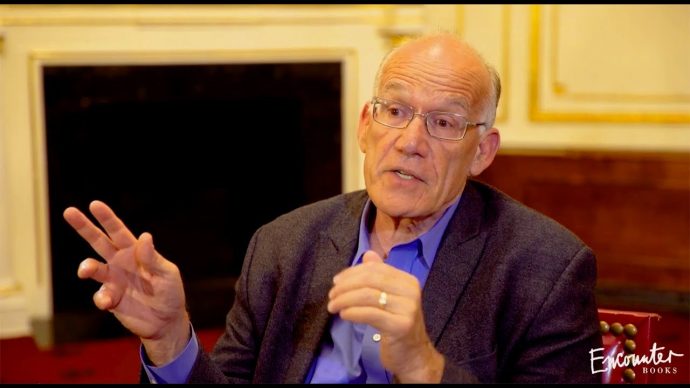This is just so good. Here is an extended excerpt courtesy of The Federalist of an interview by Ben Weingarten who interviews writer and scholar Victor Davis Hanson “on the decline of the American academy, the Democratic Party, and President Trump.”
The entire transcript can be found here. Below the following excerpt is the video interview, and the excerpted portion begins at the 14:00 minute mark.
First, The Federalist’s introduction to the interview:
Victor Davis Hanson discussed the decline of the American academy, threats to Western civilization from within and without, “The Resistance” and its assault on the Trump presidency, and a great deal more with Encounter Books’ Ben Weingarten. Watch their interview here or read the full transcript of their discussion below, slightly modified for clarity.
If you read or watch only a portion, make this the portion:
Ben Weingarten: One of the things that I find really fascinating about much of your work is that you inhabit the world of the academy, and you’re surrounded by the intellectual elites on a daily basis, and you’re a conservative intellectual yourself. You also write about where you live and what life is like in rural California, and the various maladies that in many ways kind of tie into exactly the problems that President Trump pointed out during his campaign, whether it’s drugs, gangs, garbage in the streets, and you attribute it in some part to widespread illegal immigration. How has that dichotomy in your life impacted your politics?
Victor Davis Hanson: Well, I never thought it was much … I was much different because I live in the same house that my great-great-grandmother lived. And where I grew up, I just thought it was normal. But when you’re in the academic world, that’s abnormal. So when I get up in the morning to go to work at Stanford once a week, I leave what I thought is a normal world. They think it’s abnormal, but I think their world is abnormal.
By that I mean there’s certain protocols everybody follows and that is, that you don’t gratuitously insult somebody, ’cause you’re gonna end up in a fight. Or if you’re farming with your neighbor in a communal ditch and he starts stealing water, he’ll steal more until you tell him, not just tell him to stop, but force him to stop. And three, that you’re not confined by political correctness. If somebody hits you and runs away from the scene of the accident, and he does it, and the person’s from Mexico, and the next person who does is from Mexico, and the third person who does it is from Mexico and the fourth person who does it from Mexico, then you can say inductively, there’s a lot of people here from Mexico that have no registration, no driver’s license, and no car insurance, and they have a habit of getting in wrecks and running and fleeing the scene of an accident. Whereas, when that never happens to you at Stanford, then you feel to express that complaint would be xenophobic, racist, native.
So it’s given me a clarity and it’s given me ways that I have to behave. When I come up to the academy, I’m always amazed at people who will lose their temper or they’ll scream at somebody. And it’s almost like a psychodrama, there’s no consequences to it. And I think a lot of that thinking has permeated our government, permeated our bureaucracy, and you have a lot of guilt, you have a lot of worry, you have a lot of neuroses, and I think they’d be a lot better if they lived in the communities in which they champion, “they” being a lot of progressive elites.
So what I’ve been very angry about are people who in California say, “We don’t need water transfers for agriculture,” ’cause they don’t rely on ’em … “But we do for Hetch Hetchy water for Bay Area drinking,” to the extent they know about it even. Or, “We have to have open borders, but my kids just can’t go to Menlo-Atherton anymore because it’s just too diverse and they don’t have advanced placement Mandarin,” or something. Or, “I think that we need green power and we need solar and wind, but you know what? It’s 70 degrees in the Bay Area and I really don’t … year round 60 to 70, and I don’t have to turn on the air conditioning when it’s 110 like in Bakersfield.” So I think it stops the hypocrisy when you have to live in an area that immediately the ramifications of your own ideology are apparent to you.

